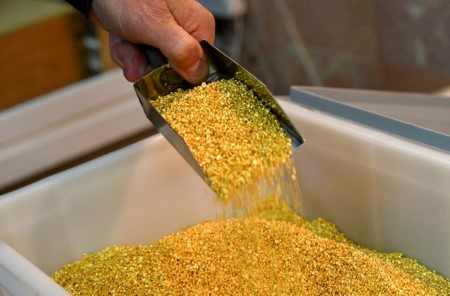




Philippines Trade Update: Imports weaken on tepid demand
 DOWNLOAD
DOWNLOAD

Policy Rate Updates: BSP outlook — cloudy with a chance of rate cut
 DOWNLOAD
DOWNLOAD

January Economic Update: Growth slows, prices rise
 DOWNLOAD
DOWNLOAD


Gold firmed on Fed pause hopes after weak US jobs data

Nov 3 – Gold prices gained on Friday as the US dollar and Treasury yields slipped after weak US jobs data cemented expectations that the Federal Reserve is done raising interest rates.
Spot gold rose 0.4% to USD 1,994.28 per ounce by 3:14 p.m. ET (1914 GMT), after hitting a session high of USD 2,003.69. US gold futures settled 0.3% higher at USD 1,999.2.
US job growth slowed more than expected in October, while wage inflation cooled, pointing to an easing in labor market conditions. Data showed employers added 150,000 jobs in October, below the 180,000 expected by economists.
“If the labor market starts to deteriorate, the Fed will be unable to continue a hawkish path. The data cements the idea of a Fed pause, which is helping gold,” said Phillip Streible, chief market strategist at Blue Line Futures in Chicago.
Higher rates increase the opportunity cost of holding zero-yield bullion.
Adding to gold’s shine, the dollar index fell 1% and benchmark 10-year US Treasury yields fell to an over one-month low after the data.
Traders are now pricing in a 95% chance that the US central bank will leave rates unchanged in December compared to 80% before the data, according to the CME FedWatch tool.
Craig Erlam, senior markets analyst at OANDA said in a note that “USD 2,000 is a big psychological barrier (for gold) and momentum indicators suggest it may be a struggle at this time.”
Investors also keep a tab on the Middle East conflict. Gold rose more than 7% in October on safe-haven demand.
“While peace isn’t likely to break out, the situation might not escalate into a regional conflict in the short term. Given gold has had a tremendous run in the past month, we could see some consolidation or even a modest retracement,” said Tai Wong, a New York-based independent metals trader
Spot silver was up 2% at USD 23.21 per ounce, platinum rose 1.5% to USD 932.78 and palladium added 1.8% to USD 1,119.21.
(Reporting by Ashitha Shivaprasad and additional reporting by Daksh Grover in Bengaluru; Editing by David Evans, Shweta Agarwal and Shailesh Kuber)
This article originally appeared on reuters.com





 By Reuters
By Reuters